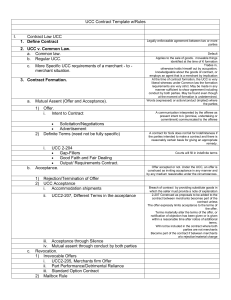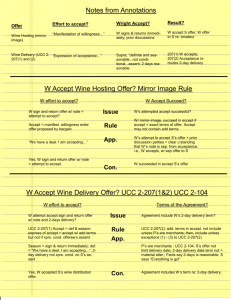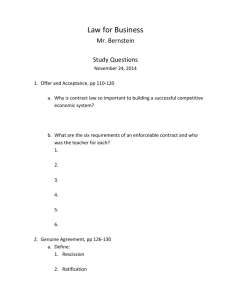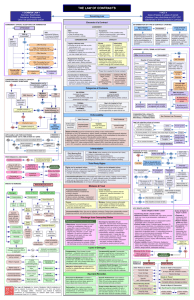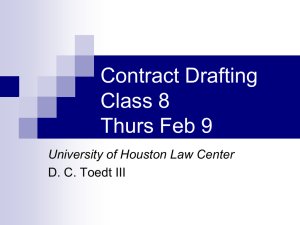UCC Codes - ENGS.net
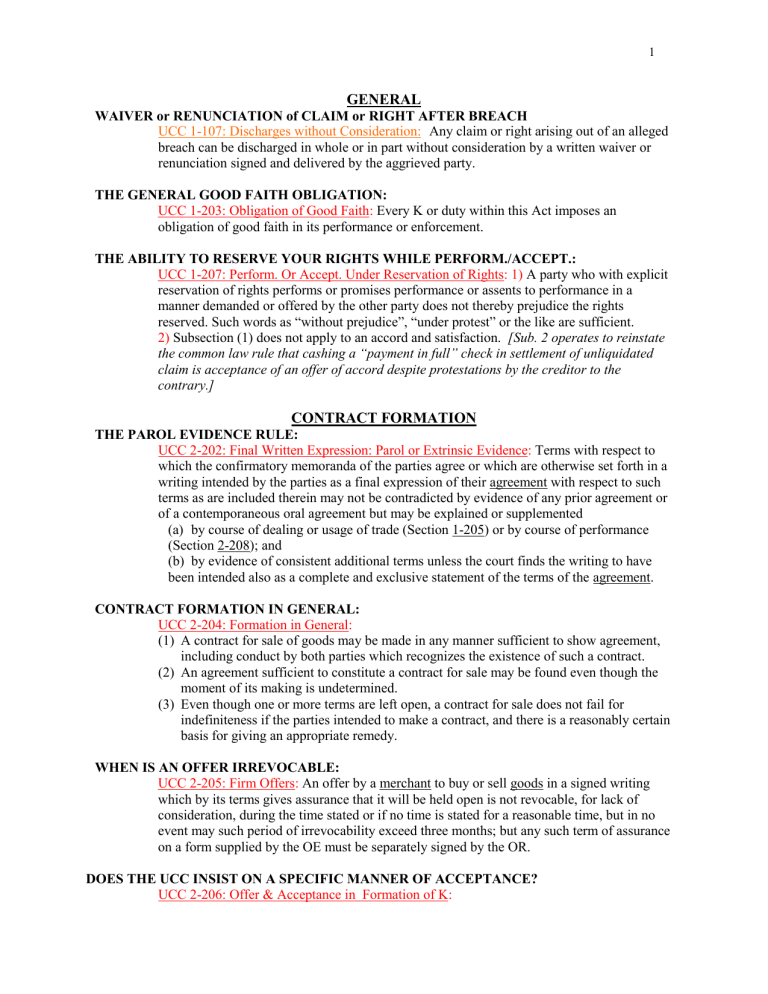
1
GENERAL
WAIVER or RENUNCIATION of CLAIM or RIGHT AFTER BREACH
UCC 1-107: Discharges without Consideration: Any claim or right arising out of an alleged breach can be discharged in whole or in part without consideration by a written waiver or renunciation signed and delivered by the aggrieved party.
THE GENERAL GOOD FAITH OBLIGATION:
UCC 1-203: Obligation of Good Faith: Every K or duty within this Act imposes an obligation of good faith in its performance or enforcement.
THE ABILITY TO RESERVE YOUR RIGHTS WHILE PERFORM./ACCEPT.:
UCC 1-207: Perform. Or Accept. Under Reservation of Rights: 1) A party who with explicit reservation of rights performs or promises performance or assents to performance in a manner demanded or offered by the other party does not thereby prejudice the rights reserved. Such words as “without prejudice”, “under protest” or the like are sufficient.
2) Subsection (1) does not apply to an accord and satisfaction. [Sub. 2 operates to reinstate the common law rule that cashing a “payment in full” check in settlement of unliquidated claim is acceptance of an offer of accord despite protestations by the creditor to the contrary.]
CONTRACT FORMATION
THE PAROL EVIDENCE RULE:
UCC 2-202: Final Written Expression: Parol or Extrinsic Evidence: Terms with respect to which the confirmatory memoranda of the parties agree or which are otherwise set forth in a writing intended by the parties as a final expression of their agreement with respect to such terms as are included therein may not be contradicted by evidence of any prior agreement or of a contemporaneous oral agreement but may be explained or supplemented
(a) by course of dealing or usage of trade (Section 1-205) or by course of performance
(Section 2-208); and
(b) by evidence of consistent additional terms unless the court finds the writing to have been intended also as a complete and exclusive statement of the terms of the agreement.
CONTRACT FORMATION IN GENERAL:
UCC 2-204: Formation in General:
(1) A contract for sale of goods may be made in any manner sufficient to show agreement, including conduct by both parties which recognizes the existence of such a contract.
(2) An agreement sufficient to constitute a contract for sale may be found even though the moment of its making is undetermined.
(3) Even though one or more terms are left open, a contract for sale does not fail for indefiniteness if the parties intended to make a contract, and there is a reasonably certain basis for giving an appropriate remedy.
WHEN IS AN OFFER IRREVOCABLE:
UCC 2-205: Firm Offers: An offer by a merchant to buy or sell goods in a signed writing which by its terms gives assurance that it will be held open is not revocable, for lack of consideration, during the time stated or if no time is stated for a reasonable time, but in no event may such period of irrevocability exceed three months; but any such term of assurance on a form supplied by the OE must be separately signed by the OR.
DOES THE UCC INSIST ON A SPECIFIC MANNER OF ACCEPTANCE?
UCC 2-206: Offer & Acceptance in Formation of K:
2
(1) Unless otherwise unambiguously indicated by the language or circumstances
(a) an offer to make a contract shall be construed as inviting acceptance in any manner and by any medium reasonable in the circumstances;
(b) an order or other offer to buy goods for prompt or current shipment shall be construed as inviting acceptance either by a prompt promise to ship or by the prompt or current shipment of conforming or non-conforming goods, but such a shipment of non-conforming goods does not constitute an acceptance if the seller seasonably notifies the buyer that the shipment is offered only as an accommodation to the buyer.
(2) Where the beginning of a requested performance is a reasonable mode of acceptance, an OR who is not notified of acceptance within a reasonable time may treat the offer as having lapsed before acceptance.
WHAT HAPPENS WHEN THE OFFEREE ADDS TERMS TO THE ACCEPTANCE?
UCC 2-207: Additional Terms in Acceptance or Confirmation:
(1) A definite and seasonable expression of acceptance or a written confirmation which is sent within a reasonable time operates as an acceptance even though it states terms additional to or different from those offered or agreed upon, unless acceptance is expressly made conditional on assent to the additional or different terms .
(2) The additional terms are to be construed as proposals for addition to the contract. Between merchants such terms become part of the contract unless:
(a) the offer expressly limits acceptance to the terms of the offer;
(b) they materially alter it; or
(c) notification of objection to them has already been given or is given within a reasonable time after notice of them is received.
(3) Conduct by both parties which recognizes the existence of a contract is sufficient to establish a contract for sale although the writings of the parties do not otherwise establish a contract. In such case the terms of the particular contract consist of those terms on which the writings of the parties agree, together with any supplementary terms incorporated under any other provisions of this Act.
MODIFICATION, RESCISSION AND WAIVER:
UCC 2-209:
(1) An agreement modifying a contract within this Article needs no consideration to be binding.
(2) A signed agreement which excludes modification or rescission except by a signed writing cannot be otherwise modified or rescinded, but except as between merchants such a requirement on a form supplied by the merchant must be separately signed by the other party.
(3) The requirements of the statute of frauds section of this Article (Section 2-201) must be satisfied if the contract as modified is within its provisions.
(4) Although an attempt at modification or rescission does not satisfy the requirements of subsection (2) or (3) it can operate as a waiver.
(4) A party who has made a waiver affecting an executory portion of the contract may retract the waiver by reasonable notification received by the other party that strict performance will be required of any term waived, unless the retraction would be unjust in view of a material change of position in reliance on the waiver.
Footnote: other consideration substitutes under Statute besides sub§ UCC 2-209(1). Convention on
Contracts for the Sale of Goods (CISG) Article 29(1) provides: A contract may be modified or terminated by the mere agreement of the parties. NYS General Obligations Law 5-1103 is also a consideration substitute requiring only a signed writing.
CONSTRUCTION OF THE CONTRACT
UNCONSCIONABILITY:
UCC 2-302 Unconscionable Contract or Clause:
(1) If the court as a matter of law finds the contract or any clause of the contract to have been unconscionable at the time it was made the court may refuse to enforce the contract, or it may enforce the remainder of the contract without the unconscionable clause, or it may so limit the application of any unconscionable clause as to avoid any unconscionable result.
3
(2) When it is claimed or appears to the court that the contract or any clause thereof may be unconscionable the parties shall be afforded a reasonable opportunity to present evidence as to its commercial setting, purpose and effect to aid the court in making the determination.
GAP-FILLERS:
UCC 2-305: Open Price Term:
If the parties intend a K, and there’s an open price term, the price is a reasonable price at the time for delivery.
UCC 2-307: Single Lot or Many Lots for Delivery: Unless otherwise agreed, the goods must be tendered in a single delivery.
UCC 2-308: Place for Delivery: Unless otherwise agreed, the place for delivery is the seller’s place of business.
UCC 2-309(1): The Time Frame for Delivering Goods: Unless otherwise agreed, the shipment or delivery should take place within a reasonable time.
UCC 2-309(3): How Much Time do you give for Terminating a K: Termination of a contract by one party except on the happening of an agreed event requires that reasonable notification be received by the other party and an agreement dispensing with notification is invalid if its operation would be unconscionable. [ This clause is implicated in dealing with illusory promises when one or the other party may terminate at will. Unlike UCC 2-302 where unconscionability is judged as of the time of the making of the K, unconscionablility under
2-309(3) is judged at the time of termination. Also, the exercise of power of termination is subject to the rule of good faith inherent in every contract.
]
UCC 2-310: When is Payment for the Goods Due: Unless otherwise agreed, payment is due at the time and place where B receives the goods.
OUTPUT, REQUIREMENTS and EXCLUSIVE DEALINGS:
UCC 2-306:
(1) A term which measures the quantity by the output of the seller or the requirements of the buyer means such actual output or requirements as may occur in good faith, except that no quantity unreasonably disproportionate to any stated estimate or in the absence of a stated estimate to any normal or otherwise comparable prior output or requirements may be tendered or demanded.
(2) A lawful agreement by either the seller or the buyer for exclusive dealing in the kind of goods concerned imposes unless otherwise agreed an obligation by the seller to use best efforts to supply the goods and by the buyer to use best efforts to promote their sale.
PERFORMANCE OF THE CONTRACT
WHEN CAN THE SELLER CURE A DEFECTIVE DELIVERY OF GOODS?
UCC 2-508:
(1)
Where S’s delivery is rejected for non-conformity, and the time for performance has not yet expired, the S may seasonably notify the B of his intention to cure, and may then w/in the K time make a conforming delivery.
(2) Where B rejects a non-conforming tender which the S had reasonable grounds to believe would be acceptable w/ or w/o money allowance, the S may if he seasonably notifies the
B have a further reasonable time to substitute conforming tender.
THE BUYER’S RIGHT TO INSPECT GOODS:
UCC 2-513:
(1) Unless otherwise agreed, B has a right before payment or acceptance to inspect the goods at any reasonable place and time and in any reasonable manner. The inspection can take place after the goods arrive.
4
BREACH, REPUDIATION & EXCUSE
THE PERFECT TENDER RULE: THE BUYER’S RIGHTS W/ NON-CONFORMING GOODS:
UCC 2-601: Subject to the UCC provisions on breach of installment K’s (2-612), and unless otherwise agreed, if the goods or the tender of delivery fail in any respect to conform to the
K, B may-
(a) reject the whole, or
(b) accept the whole, or
(c) accept any commercial unit(s) and reject the rest.
THE PROPER WAY FOR THE BUYER TO REJECT NON-CONFORMING GOODS:
UCC 2-602:
(1) The rejection of goods must be within a reasonable time after their delivery or tender. It is ineffective unless the B seasonably notifies the S.
(2) Subject to sections 2-603 and 2-604,
(a) after B rejects, any exercise of ownership by B is wrongful against the S; and
(b) if the B has physical possession of the goods before he rejects them, he has a duty to hold them with reasonable care at the S’s disposition for a time sufficient to permit the S to remove them.
MERCHANT BUYER’S DUTIES AS TO RIGHTFULLY REJECTED GOODS:
UCC 2-603:
(1) If S has no agent or business in B’s market, B must follow any reasonable instructions received from S with respect to the goods, and if S gives no instructions, B should make reasonable efforts to sell the goods for S’s account if they are perishable or will decline in value quickly.
WAIVER OF BUYER’S OBJECTIONS BY FAILURE TO PARTICULARIZE:
UCC 2-605:
(1)
B’s failure to state in connection w/ a rejection a particular defect which is ascertainable by reasonable inspection, precludes him from relying on the unstated defect to justify rejection or to establish breach
(a) where S could have cured it if stated seasonably, or
(b) between merchants, when after rejection S has requested in writing a final statement of all defects.
THE THREE WAYS THAT A BUYER CAN ACCEPT GOODS:
UCC 2-606:
(1) Acceptance of goods occurs when the buyer: a) after a reasonable opportunity to inspect the goods signifies to the seller that the goods are conforming or that he will take or retain them in spite of their nonconformity; or b) fails to make an effective rejection (subsection (1) of Section 2-602), but such acceptance does not occur until the buyer has had a reasonable opportunity to inspect them; or c) does any act inconsistent with the seller’s ownership; but if such act is wrongful as against the seller it is an acceptance only if ratified by him. [Seller has choice to treat this as a breach of contract or a tort of conversion.]
(2) Acceptance of a part of any commercial unit is acceptance of that entire unit.
THE EFFECT OF B’S ACCEPTANCE – WHAT IF B FINDS A BREACH AFTER ACCEPT.
UCC 2-607:
5
(1) B must pay at the contract rate for any goods accepted.
(3) If B has accepted a tender,
(a) the B, within a reasonable time after discovering the breach, must notify S of
breach or be barred from any remedy.
WHEN THE BUYER REVOKES HIS ACCEPTANCE:
UCC 2-608:
(1) B may revoke his acceptance of a lot or commercial unit whose non-conformity substantially impairs its value to him if he has accepted it
(a) on the reasonable assumption that its non-conformity would be cured and it has not been seasonably cured, or
(b) without discovering the non-conformity because his acceptance was reasonably induced either by the difficulty of discovery before acceptance or by the S’s assurances.
(2) Revocation of acceptance must occur within a reasonable time after B discovers the nonconformity and before any substantial change in condition of the goods which is not caused by their own defects. Revocation of acceptance is effective when S is notified.
(3) A buyer who revokes his acceptance has the same rights as the B who rightfully rejects.
BUYER & SELLER’S RIGHT FOR ADEQUATE ASSURANCE OF PERFORMANCE:
UCC 2-609:
(1) When reasonable grounds for insecurity arise with respect to the performance of either party, the other may in writing demand adequate assurance of due performance and until he receives such assurance, may if commercially reasonable, suspend any performance for which he has not already received the agreed return.
(2) Between merchants, the reasonableness of grounds for insecurity and the adequacy of any assurance is determined by commercial standards.
(3) Acceptance of any improper delivery/payment does not prejudice the aggrieved party’s right to demand adequate assurance of future performance.
(4) Once a party receives a justified demand for assurances, failure to provide adequate assurances within a reasonable time not exceeding 30 days is a repudiation of the K.
ANTICIPATORY REPUDIATION:
UCC 2-610: When either party gives an anticipatory repudiation (before performance is due), the aggrieved party may
(a) await performance for a commercially reasonable time, or
(b) resort to any remedy for breach (2-703 or 2-711), even though he has notified the repudiating party that he would await performance and has urged retraction, and
(c) with either section (a) or (b), he can suspend his own performance.
RETRACTION OF ANTICIPATORY REPUDIATION:
UCC 2-611:
(1) The repudiation can be retracted unless the aggrieved party has cancelled the K or materially changed his position or otherwise indicated that he considers the repudiation final.
(2) Retraction can be by any method which clearly indicates that the repudiating party intends to perform, but it must include any assurance justifiably demanded under 2-609.
WHAT CONSTITUTES BREACH OF AN INSTALLMENT CONTRACT:
6
UCC 2-612:
(1) An installment K is one which requires or authorizes the delivery of goods in separate lots to be separately accepted, even though the K has a clause “each delivery is a separate K.”
(2) B may reject any installment which is non-conforming if the non-conformity substantially impairs the value of that installment and it can’t be cured. But if the nonconformity doesn’t fall within (3), and the S gives assurance of a cure, the B must accept the installment.
(3) There is a breach of the whole K if the non-conformity (of one or more installments) substantially impairs the value of the whole K.
SUBSTITUTED PERFORMANCE FOR A MANNER OF PERFORMANCE OR PAYMENT
THAT IS NO LONGER AVAILABLE OR PRACTICABLE:
UCC 2-614:
(1) Where without fault of either party, the agreed manner of performance is unavailable or becomes commercially impracticable, but a commercially reasonable substitute is available, such substitute performance must be tendered and accepted.
(2) If the manner of payment fails b/c of govt regulation, the S may withhold or stop delivery unless the B provides a manner of payment which is commercially equivalent.
IMPOSSIBILITY OF PERFORMANCE – IMPRACTICABILITY (for S) – Partial Impossibility:
Note- the UCC doesn’t cover frustration of the venture, B must use the C/L for that excuse.
UCC 2-615: Except so far as a S may have assumed a greater obligation in the K, and subject to 2-614 on substituted performance:
(a) Delay in delivery or non-delivery (of whole or part) by S who complies with (b) and (c) below, is not in breach of K if the performance as agreed has been made impracticable by the occurrence of a contingency the non-occurrence of which was a basic assumption on which the K was made, or by compliance in good faith w/ any govt regulation, whether or not it later proves to be invalid.
(b)
When there’s only partial impossibility of S’s capacity to perform- S must allocate production and deliveries among his customers, but may at his option include regular customers not then under contract as all as his own requirements for further manufacture. S can allocate in any manner that is fair and reasonable.
(c) The S must notify the B seasonably that there will be a delay or non-delivery b/c of paragraph (b).
WHAT THE BUYER MAY DO AS A RESPONSE TO S’s IMPRACTICABILITY:
UCC 2-616:
(1) When the B receives notification of a material or indefinite delay or an allocation b/c of
2-615, and if the prospective deficiency substantially impairs the value of the whole K under 2-612, he can write to the S
(a) to terminate the K, thereby discharging any unexecuted portion of the K, or
(b) to modify the K by agreeing to take the available quota in substitution.
(2) If the B fails to modify the K within a reasonable time (not more than 30 days) after receiving notification from S, the K lapses with respect to the affected deliveries.
(3)
The provisions of this section can’t be negated by K, except that S can assume a greater obligation.
7
UCC & DAMAGES
BUYER’S DAMAGES SELLER’S
DAMAGES
B’s Remedies in General- 2-711 S’s Remedies in General- 2-703
B’s Damages for Cover- 2-712 S’s Damages for Resale- 2-706
= Cover price – K price = resale price – K price
B’s Dmgs for S’s Non-Delivery or Repudiation- S’s Dmges for B’s Non-Accept. or
Repud .
-2-713 2-708
= MP time learned of breach – K price = unpaid K price – MP time of tender
B’s Incidental & Consequential Dmges- 2-715 S’s Incidental Dmges- 2-710
B’s Dmges if B accepts non-conforming goods and S’s Action for the Price- 2-709
Notifies S of the breach- 2-714
S’s Dmges for Specially Manufact. Goods-
2-704 = market formula doesn’t put
seller in the position as if B had fully
performed, so get profit.
B’s Right to Specific Performance- 2-716
B’s right to deduct partial damages from the price- 2-717
As long as B notifies the S, B can deduct partial damages from any part of the price still due under the same contract.
2-718: Liquidation or Limitation of Damages, & Deposits.
- - - - - - - - - - - - - - - -
8
THE EFFECT OF L.D. CLAUSES ON BUYERS & SELLERS – WHEN B BREACHES, CAN
HE GET RESTITUTION (equivalent to the material breacher trying to get restitution in quasi-k)
UCC 2-718:
(1) Damages for breach by either party may be liquidated in the agreement but only at an amount which is reasonable in the light of the anticipated or actual harm caused by the breach, the difficulties of proof of loss, and the inconvenience or nonfeasibility of otherwise obtaining an adequate remedy. A term fixing unreasonably large liquidated damages is void as a penalty.
(2) Where the S justifiably withholds delivery of goods because of the B’s breach, the B is entitled to restitution of any amount by which the sum of his payments exceeds: 20% of the value of the total performance or $500, whichever is smaller.
ASSIGNMENT & DELEGATION
UCC 2-210:
(1) A party may perform his duty through a delegate unless otherwise agreed or unless the other party has a substantial interest in having his original promisor perform or control the acts required by the K. No delegation of performance relieves the party delegating of any duty to perform or any liability for breach.
(2) Unless otherwise agreed, all rights of either seller or buyer can be assigned except where the assignment would materially change the duty of the other party, or increase materially the burden or risk imposed on him by his K, or impair materially his chance of obtaining return performance. A right to damages for breach of the whole K or a right arising out of the assignor’s due performance of his entire obligation can be assigned despite agreement otherwise.
(3)
Unless the circumstances indicate the contrary, a prohibition of assignment of “the contract” is to be construed as barring only the delegation to the assignee of the assignor’s performance.
(4)
An assignment of “the contract” or of “all my rights under the contract” or an assignment in similar general terms is an assignment of rights and unless the language or the circumstances (as in an assignment for security) indicate the contrary, it is a delegation of performance of the duties of the assignor and its acceptance by the assignee constitutes a promise by him (assumption) to perform those duties. This promise is enforceable by either the assignor or the other party to the original K.
(5) The other party may treat any assignment which delegates performance as creating reasonable grounds for insecurity and may w/o prejudice to his rights against the assignor, demand assurances from the assignee ( 2-609 ).
9
ADDENDUM:
RESTATEMENTS Contracts
§45 Making an offer to a unilateral contract irrevocable:
“If an offer for a unilateral contract is made, and part of the consideration requested in the offer is given or tendered by the offeree in response thereto, the offeror is bound by a contract, the duty of immediate performance of which is conditional on the full consideration being given or tendered within the time stated in the offer , or, if no time is stated therein, within a reasonable time.”
Comment b states that the “main offer includes as a subsidiary promise, necessarily implied, that if part of the requested performance is given, the offeror will not revoke his offer, and that if tender is made it will be accepted. Part performance or tender may thus furnish consideration for the subsidiary promise. Moreover, merely acting in justifiable reliance on an offer may in some cases serve as sufficient reason for making a promise binding (see §90).”
R2K: option contracts supported by Recitation of consideration:
“an offer is binding as an option contract if it is in writing and signed by the offeror, recites a purported consideration for the making of the offer, and proposes an exchange on fair terms within a reasonable time.”
§90 Promissory Estoppel
“ A promise which the promisor should reasonably expect to induce action or forbearance of a definite and substantial character on the part of the promisee and which does induce such action or forbearance is binding if injustice can be avoided only by enforcement of the promise.”
RESTATEMENT (2D) OF CONTRACTS:
§ 344. PURPOSES OF REMEDIES
Judicial remedies under the rules stated in this Restatement serve to protect one or more of the following interests of a promisee:
(a) his "expectation interest," which is his interest in having the benefit of his bargain by being put in as good a position as he would have been in had the contract been performed,
(b) his "reliance interest," which is his interest in being reimbursed for loss caused by reliance on the contract by being put in as good a position as he would have been in had the contract not been made, or
(c) his "restitution interest," which is his interest in having restored to him any benefit that he has conferred on the other party.
Comment a.
Three interests. The law of contract remedies implements the policy in favor of allowing individuals to order their own affairs by making legally enforceable promises. Ordinarily, when a court concludes that there has been a breach of contract, it enforces the broken promise by protecting the expectation that the injured party had when he made the contract. It does this by attempting to put him in as good a position as he would have been in had the contract been performed, that is, had there been no breach. The interest protected in this way is called the "expectation interest." It is sometimes said to give the injured party the "benefit of the bargain."
10
This is not, however, the only interest that may be protected. The promisee may have changed his position in reliance on the contract by, for example, incurring expenses in preparing to perform, in performing, or in foregoing opportunities to make other contracts. In that case, the court may recognize a claim based on his reliance rather than on his expectation. It does this by attempting to put him back in the position in which he would have been had the contract not been made. The interest protected in this way is called "reliance interest." Although it may be equal to the expectation interest, it is ordinarily smaller because it does not include the injured party's lost profit. In some situations a court will recognize yet a third interest and grant relief to prevent unjust enrichment. This may be done if a party has not only changed his own position in reliance on the contract but has also conferred a benefit on the other party by, for example, making a part payment or furnishing services under the contract. The court may then require the other party to disgorge the benefit that he has received by returning it to the party who conferred it. The interest of the claimant protected in this way is called the "restitution interest."
Although it may be equal to the expectation or reliance interest, it is ordinarily smaller because it includes neither the injured party's lost profit nor that part of his expenditures in reliance that resulted in no benefit to the other party.
The interests described in this Section are not inflexible limits on relief and in situations in which a court grants such relief as justice requires, the relief may not correspond precisely to any of these interests.
See §§ 15, 87, 89, 90, 139, 158 and 272.
§ 347. MEASURE OF DAMAGES IN GENERAL
Subject to the limitations stated in §§ 350-53, the injured party has a right to damages based on his expectation interest as measured by
(a) the loss in the value to him of the other party's performance caused by its failure or deficiency, plus
(b) any other loss, including incidental or consequential loss, caused by the breach, less
(c) any cost or other loss that he has avoided by not having to perform.
Comment b
Loss in value. The first element that must be estimated in attempting to fix a sum that will fairly represent the expectation interest is the loss in the value to the injured party of the other party's performance that is caused by the failure of, or deficiency in, that performance. If no performance is rendered, the loss in value caused by the breach is equal to the value that the performance would have had to the injured party. . . . If defective or partial performance is rendered, the loss in value caused by the breach is equal to the difference between the value that the performance would have had if there had been no breach and the value of such performance as was actually rendered. In principle, this requires a determination of the values of those performances to the injured party himself and not their values to some hypothetical reasonable person or on some market. . . . They therefore depend on his own particular circumstances or those of his enterprise, unless consideration of these circumstances is precluded by the limitation of foreseeability (§ 351). Where the injured party's expected advantage consists largely or exclusively of the realization of profit, it may be possible to express this loss in value in terms of money with some assurance. In other situations, however, this is not possible and compensation for lost value may be precluded by the limitation of certainty. See § 352. In order to facilitate the estimation of loss with sufficient certainty to award damages, the injured party is sometimes given a choice between alternative
bases of calculating his loss in value. The most important of these are stated in §' 348. See also §§ 349 and
373.
§ 348. ALTERNATIVES TO LOSS IN VALUE OF PERFORMANCE
(1) If a breach delays the use of property and the loss in value to the injured party is not proved with reasonable certainty, he may recover damages based on the rental value of the property or on interest on the value of the property.
(2) If a breach results in defective or unfinished construction and the loss in value to the injured party is not proved with sufficient certainty, he may recover damages based on
(a) the diminution in the market price of the property caused by the breach, or
(b) the reasonable cost of completing performance or of remedying the defects if that cost is not clearly disproportionate to the probable loss in value to him.
11
(3) If a breach is of a promise conditioned on a fortuitous event and it is uncertain whether the event would have occurred had there been no breach, the injured party may recover damages based on the value of the conditional right at the time of breach.
Comment c
Incomplete or defective performance. If the contract is one for construction, including repair or similar performance affecting the condition of property, and the work is not finished, the injured party will usually find it easier to prove what it would cost to have the work completed by another contractor than to prove the difference between the values to him of the finished and the unfinished performance. Since the cost to complete is usually less than the loss in value to him, he is limited by the rule on avoidability to damages based on cost to complete. See§ 350(1). If he has actually had the work completed, damages will be based on his expenditures if he comes within the rule stated in § 350(2).
Sometimes, especially if the performance is defective as distinguished from incomplete, it may not be possible to prove the loss in value to the injured party with reasonable certainty. In that case he can usually recover damages based on the cost to remedy the defects. Even if this gives him a recovery somewhat in excess of the loss in value to him, it is better that he receive a small windfall than that he be undercompensated by being limited to the resulting diminution in the market price of his property.
Sometimes, however, such a large part of the cost to remedy the defects consists of the cost to undo what has been improperly done that the cost to remedy the defects will be clearly disproportionate to the probable loss in value to the injured party. Damages based on the cost to remedy the defects would then give the injured party a recovery greatly in excess of the loss in value to him and result in a substantial windfall. Such an award will not be made.
It is sometimes said that the award would involve "economic waste," but this is a misleading expression since an injured party will not, even if awarded an excessive amount of damages, usually pay to have the defects remedied if to do so will cost him more than the resulting increase in value to him. If an award based on the cost to remedy the defects would clearly be excessive and the injured party does not prove the actual loss in value to him, damages will be based instead on the difference between the market price that the property would have had without the defects and the market price of the property with the defects. This diminution in market price is the least possible loss in value to the injured party, since he could always sell the property on the market even if it had no special value to him.
§ 351. UNFORESEEABILITY AND RELATED LIMITATIONS ON DAMAGES
(1) Damages are not recoverable for loss that the party in breach did not have reason to foresee as a probable result of the breach when the contract was made.
(2) Loss may be foreseeable as a probable result of a breach because it follows from the breach
(a) in the ordinary course of events, or
(b) as a result of special circumstances, beyond the ordinary course of events, that the party in breach had reason to know.
(3) A court may limit damages for foreseeable loss by excluding recovery for loss of profits, by allowing recovery only for loss incurred in reliance, or otherwise if it concludes that in the circumstances justice so requires in order to avoid disproportionate compensation.
